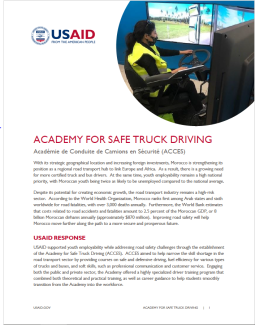Académie de Conduite de Camions en Sécurité (ACCES)
With its strategic geographical location and increasing foreign investments, Morocco is strengthening its position as a regional road transport hub to link Europe and Africa. As a result, there is a growing need for more certified truck and bus drivers. At the same time, youth employability remains a high national priority, with Moroccan youth being twice as likely to be unemployed compared to the national average.
Despite its potential for creating economic growth, the road transport industry remains a high-risk sector. According to the World Health Organization, Morocco ranks first among Arab states and sixth worldwide for road fatalities, with over 3,000 deaths annually. Furthermore, the World Bank estimates that costs related to road accidents and fatalities amount to 2.5 percent of the Moroccan GDP, or 8 billion Moroccan dirhams annually (approximately $870 million). Improving road safety will help Morocco move further along the path to a more secure and prosperous future.
USAID RESPONSE
USAID supported youth employability while addressing road safety challenges through the establishment of the Academy for Safe Truck Driving (ACCES). ACCES aimed to help narrow the skill shortage in the road transport sector by providing courses on safe and defensive driving, fuel efficiency for various types of trucks and buses, and soft skills, such as professional communication and customer service. Engaging both the public and private sector, the Academy offered a highly specialized driver training program that combined both theoretical and practical training, as well as career guidance to help students smoothly transition from the Academy into the workforce.
In collaboration with relevant government stakeholders, ACCES initiated the scale up of this training model to additional educational institutions in Morocco, one in Casablanca and the second in Tangier-Tetouan-Al Hoceima region, enhancing educational outcomes and driving skills to further improve road safety and youth employability in the transport sector.
RESULTS
- Assessed future skills and job needs in the Moroccan road transport sector.
- Upgraded the capacity of the host training center by furnishing two driving simulators and a modern semi-trailer truck, and by refurbishing the training facilities.
- Established a career office within the host training center, which provides soft skills training and career counseling services adapted to the transport and logistic sector.
- Developed truck and bus driving training curricula, which have been approved by the relevant Moroccan authorities and the private sector.
- Trained 66 young Moroccans, who graduated from the two ACCES programs, in safe truck driving and bus driving.
- Trained 406 youth on the ACCES career office soft skills program.
- Trained 82 trainers from public and private training centers in the transport and logistic sector and in eight different Morccan regions to support dissemination of knowledge and best practices.
- Trained 389 transport professionals, from 70 companies, in safe and environmentally friendly driving techniques.
- 420 young trainess participated in the workshops and events conducted by the ACCES Career Services.
Facts & Figures
IMPLEMENTING PARTNER:
- United Nations Industrial Development Organization
HOST-COUNTRY GOVERNMENT PARTNERS:
- Ministry of National Education, Vocational Training, Higher Education, and Scientific Research
- Ministry of Transport, and Logistics
- Office of Vocational Training and Job Promotion
PRIVATE SECTOR PARTNERS:
- Volvo Group
- Federation of Transport and Logistics in Morocco


